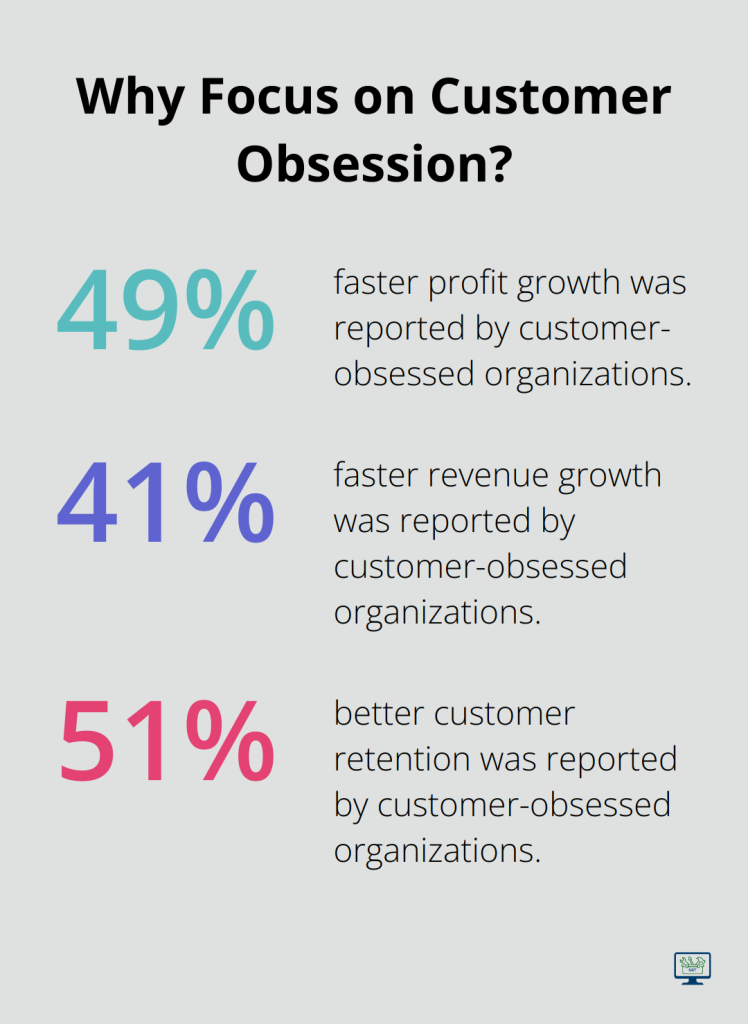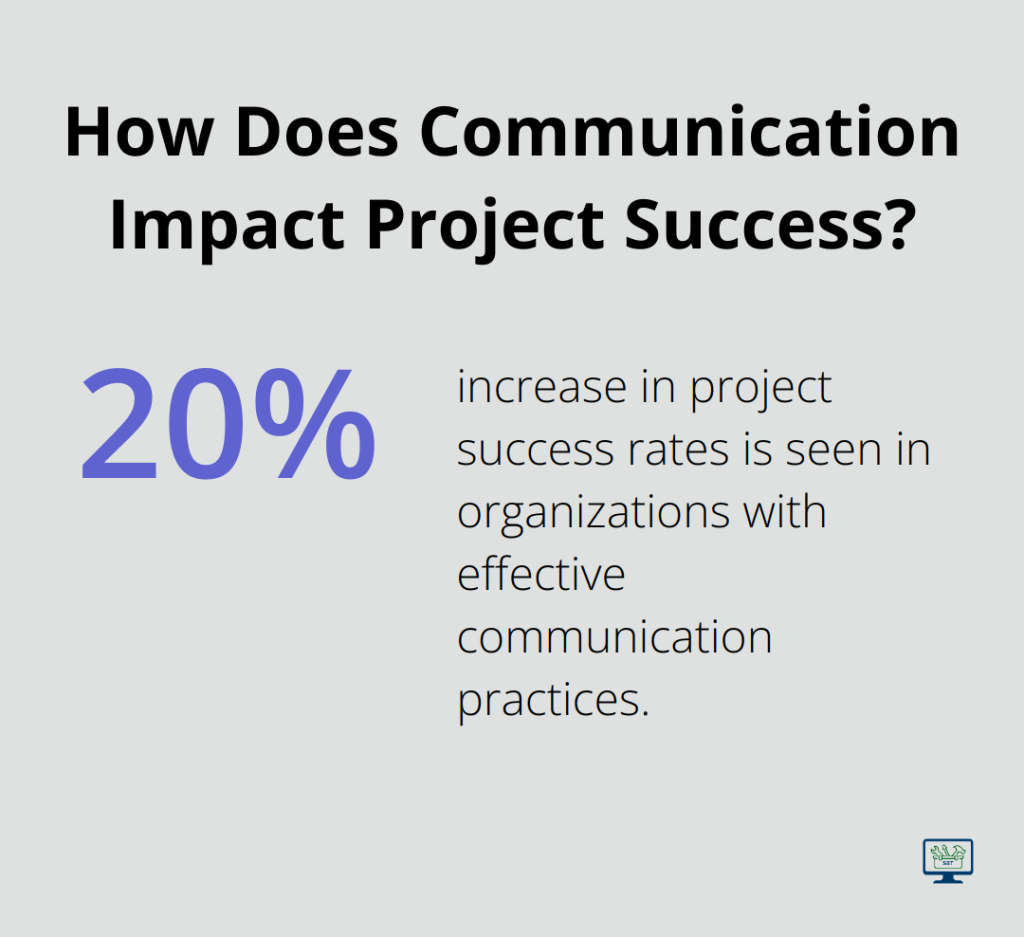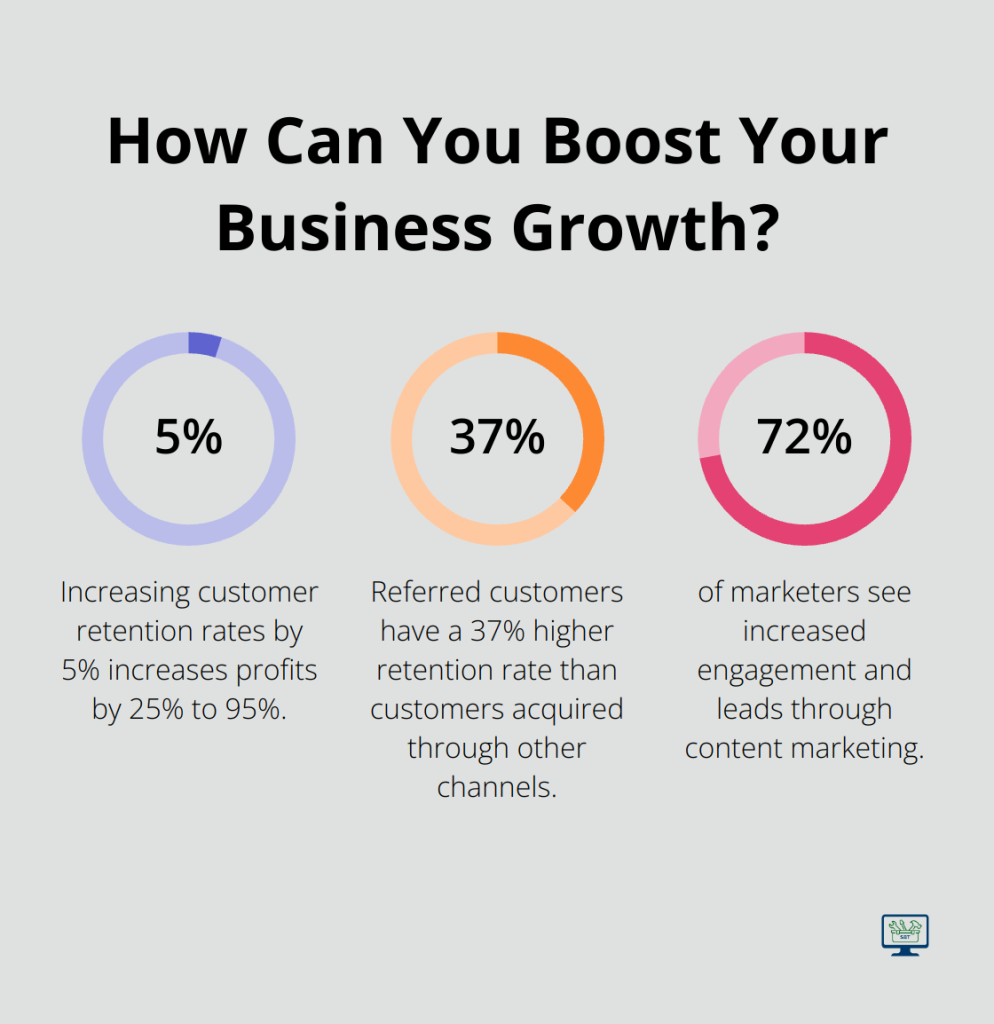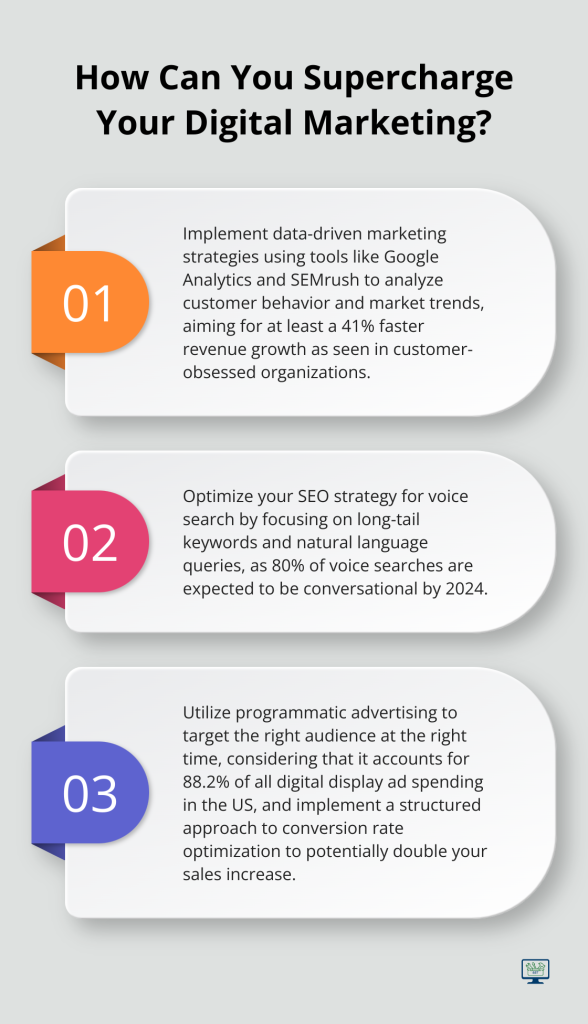At SmallBizToolbox, we’ve seen firsthand how a skilled business marketing strategist can transform a company’s growth trajectory.
These professionals are the architects of marketing success, crafting strategies that propel businesses forward in today’s competitive landscape.
From boosting brand awareness to driving customer acquisition, a top-notch marketing strategist is often the difference between stagnation and explosive growth.
In this post, we’ll explore the critical role of these experts and why your business needs one.
What Does a Business Marketing Strategist Do?
A business marketing strategist serves as the driving force behind a company’s marketing success. These professionals take on multiple roles, from data analyst to creative director, while maintaining a laser focus on company growth.
Creating Data-Driven Marketing Strategies
The core responsibility of a marketing strategist involves the creation and implementation of effective marketing strategies. This process relies on in-depth data analysis rather than guesswork or blind trend-following.

A study by Forrester highlights the importance of data-driven marketing: customer-obsessed organizations reported 41% faster revenue growth, 49% faster profit growth, and 51% better customer retention than those at lower levels of customer obsession. This statistic underscores the value of using data to inform marketing decisions.
Marketing strategists utilize tools such as Google Analytics, SEMrush, and social media insights to collect and analyze data. They then apply this information to develop targeted campaigns that resonate with their audience and produce tangible results.
Anticipating Market Trends
The business landscape evolves constantly, requiring a good marketing strategist to stay ahead of the curve. This involves monitoring industry trends, consumer behavior, and emerging technologies.
Consider the rise of voice search and its implications for SEO strategies. Recent predictions suggest that around 80% of voice searches are expected to be conversational by 2024, diverging from traditional search methods. A savvy marketing strategist would recognize this trend and adjust their SEO strategy accordingly (perhaps by optimizing for long-tail keywords and natural language queries).
Aligning Marketing with Business Objectives
A marketing strategist doesn’t operate in isolation. They collaborate closely with other departments to ensure marketing efforts align with overall business objectives. This collaboration might involve:
- Working with the sales team to generate quality leads
- Coordinating with product development to promote new features
- Partnering with customer service to improve customer retention
A report by the CMO Council titled “Sales & Marketing: Driving Revenue Through Collaboration,” examines the marketing and sales relationship and how it should evolve. This emphasizes the importance of cross-departmental collaboration in driving business success.
Measuring and Analyzing Performance
Marketing strategists must continually assess the effectiveness of their strategies. They track key performance indicators (KPIs) such as return on investment (ROI), customer acquisition cost (CAC), and customer lifetime value (CLV).
By analyzing these metrics, strategists can identify which strategies work best and which need adjustment. This data-driven approach allows for continuous improvement and optimization of marketing efforts.
As we move forward, let’s explore the essential skills and qualifications that make a business marketing strategist truly effective in driving company growth.
What Makes a Top Business Marketing Strategist?
Analytical Prowess
Top business marketing strategists excel at data analysis. They interpret data to uncover actionable insights. A McKinsey report reveals insights into how customer analytics champions achieve success in their organizations.

These professionals use tools like Google Analytics, Tableau, and Power BI to analyze customer behavior, market trends, and campaign performance. They spot patterns and translate complex data into clear, actionable strategies (a skill that’s increasingly valuable in today’s data-driven marketing landscape).
Cross-Functional Communication Skills
Marketing doesn’t operate in isolation. The best strategists communicate effectively across various departments. A study by the Project Management Institute found that organizations with effective communication practices see a 20% increase in project success rates.
These professionals translate marketing jargon into language that resonates with different teams. They lead presentations, write compelling reports, and facilitate productive brainstorming sessions. Their ability to build relationships across departments ensures marketing strategies align with overall business goals.
Digital Marketing Technology Expertise
In today’s digital landscape, proficiency in marketing technologies is essential. The most effective strategists stay ahead of the curve by mastering a range of digital tools.
They’re proficient in marketing automation platforms (like HubSpot or Marketo), social media management tools (such as Hootsuite or Sprout Social), and SEO tools (including SEMrush or Ahrefs). Gartner’s tech marketing benchmarks provide valuable insights for tech marketing leaders and their teams about their peers’ practices.
Continuous Learning Mindset
Top strategists understand the importance of ongoing education. They stay updated on emerging technologies and aren’t afraid to experiment with new tools that could give their company a competitive edge.
This commitment to learning extends beyond technology. They keep abreast of industry trends, consumer behavior shifts, and new marketing methodologies. This continuous learning mindset allows them to adapt strategies quickly and maintain a competitive advantage in the ever-evolving marketing landscape.
Strategic Thinking and Creativity
The best marketing strategists combine analytical skills with creative thinking. They don’t just follow trends; they create them. These professionals can see the big picture while also focusing on the details that make a strategy successful.
They brainstorm innovative campaign ideas, develop unique brand positioning, and find creative solutions to marketing challenges. This blend of strategic thinking and creativity allows them to develop marketing strategies that stand out in crowded markets and resonate with target audiences.
As we explore the impact of these skilled professionals on company growth, it becomes clear why businesses should prioritize hiring or developing top-tier marketing strategists.
How Marketing Strategists Drive Company Growth
Marketing strategists transform marketing efforts into tangible business results. Their impact extends far beyond creating catchy slogans or eye-catching advertisements. Let’s explore how these professionals drive growth across multiple fronts.
Boost Brand Awareness and Market Share
Marketing strategists increase brand visibility and capture a larger slice of the market through targeted campaigns that resonate with the intended audience. Statistics show 3.5 times more brand visibility for brands that maintained their marketing output during challenging times.
Content marketing proves an effective tactic employed by strategists. The Content Marketing Institute reports that 72% of marketers see increased engagement and leads through content marketing. Strategists create valuable, relevant content to position their company as an industry thought leader, which attracts potential customers and increases market share.
Accelerate Customer Acquisition and Retention
Marketing strategists focus on attracting new customers and keeping existing ones. They understand that customer retention often costs less than acquisition. Bain & Company reports that increasing customer retention rates by 5% increases profits by 25% to 95%.

To drive acquisition, strategists implement referral programs. These programs prove highly effective, with Deloitte data showing that referred customers have a 37% higher retention rate and 18% lower churn than customers acquired through other channels.
For retention, strategists use personalized email marketing campaigns. A study by Experian found that personalized emails deliver 6x higher transaction rates. Strategists segment customers and tailor messages to significantly boost engagement and loyalty.
Optimize Return on Marketing Investments
Marketing strategists ensure that every dollar spent on marketing generates the maximum possible return. They achieve this through careful planning, precise targeting, and continuous optimization of marketing efforts.
Strategists leverage programmatic advertising, which uses AI to buy ad space in real-time, ensuring ads reach the right people at the right time. eMarketer reports that programmatic advertising accounts for 88.2% of all digital display ad spending in the US (highlighting its effectiveness).
Marketing strategists also focus on conversion rate optimization (CRO). They continually test and refine landing pages, call-to-action buttons, and user journeys to increase conversion rates significantly. Invesp reports that companies with a structured approach to conversion optimization are twice as likely to see a large increase in sales.
These targeted efforts allow marketing strategists to drive sustainable and measurable growth aligned with overall business objectives. Their strategic approach transforms marketing from a cost center into a powerful engine for business expansion.
Final Thoughts
Business marketing strategists play a vital role in driving company growth. These professionals combine analytical skills, creative thinking, and technological expertise to craft strategies that boost brand awareness, increase market share, and optimize marketing investments. Their ability to anticipate market trends, align marketing efforts with business objectives, and measure performance makes them invaluable assets in today’s competitive business landscape.

We at SmallBizToolbox recognize the challenges small businesses face in implementing effective marketing strategies. Our platform provides a comprehensive suite of tools and resources designed to support your marketing efforts. From AI-driven content creation to SEO optimization and social media aids, we offer the resources you need to compete effectively in the digital marketplace.
Investing in strategic marketing is essential for businesses aiming to thrive in today’s dynamic environment. Effective marketing focuses on spending smarter, not just spending more. With the right strategies and tools in place (including those offered by SmallBizToolbox), even small businesses can achieve remarkable growth and establish a strong market presence.
How useful was this Resource?
Click on a star to rate it!
Average rating 0 / 5. Vote count: 0
No votes so far! Be the first to rate this post.
We are sorry that this post was not useful for you!
Let us improve this Resource!
Tell us how we can improve this Resource?




